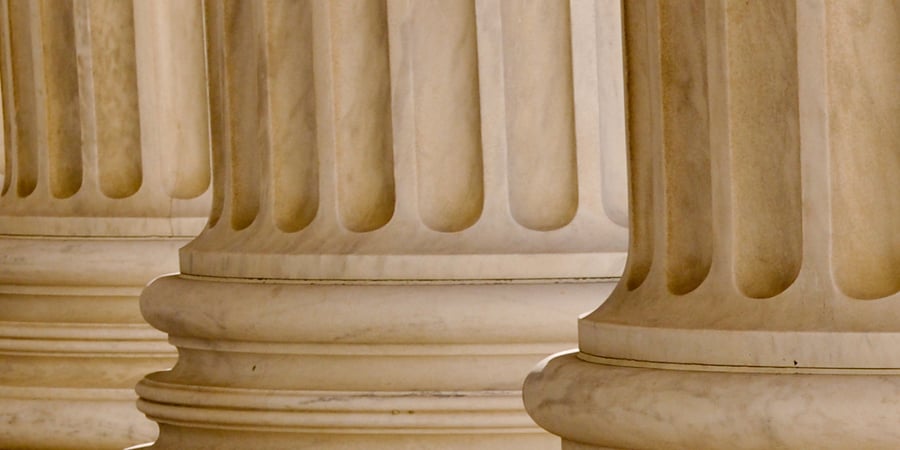The Supreme Court of the United States issued four decisions today:
Moore v. United States, No. 22-800: This case concerns the constitutionality of the Mandatory Repatriation Tax (“MRT”) included in the 2017 Tax Cuts and Jobs Act, which imposed a one-time tax on the earnings of shares held in American-controlled foreign corporations. Two taxpayers argued that because the MRT applied to unrealized earnings not yet distributed to shareholders, it was a direct tax that must be apportioned among the States according to a State’s population under the Constitution’s Direct Tax Clause, rather than an income tax that may be imposed on individuals under the Sixteenth Amendment. In a 7-2 opinion authored by Justice Kavanaugh, the Court held that the MRT was constitutional. Relying on past Court precedents and Congress’s history, the Court framed its holding as “narrow,” and limited it to “pass-through” entities where there is “(i) taxation of the shareholders of an entity, (ii) on the undistributed income realized by the entity, (iii) which has been attributed to the shareholders, (iv) when the entity itself has not been taxed on that income.” The Court did not decide whether realization was always required for a tax to be valid under the Sixteenth Amendment. Justice Barrett (joined by Justice Alito) and Justice Jackson authored concurrences. Justice Thomas (joined by Justice Gorsuch) dissented.
View the Court's decision.
Chiaverini v. City of Napoleon, Ohio, No. 23-50: This case addresses whether a lawsuit for malicious prosecution of a baseless criminal charge can be maintained when the government demonstrates probable cause for a different, otherwise-valid criminal charge. Jascha Chiaverini was charged with three crimes and was detained for three days. After the charges were dropped, Chiaverini sued the arresting officers for malicious prosecution under 42 U.S.C. § 1983, which requires proof that a criminal charge was brought without probable cause, leading to an unreasonable seizure of a person. The lower courts dismissed the lawsuit after finding that two of the three charges were supported by probable cause, but not addressing whether the third charge was justified. In a 6-3 opinion authored by Justice Kagan, the Court reversed and held that the Fourth Amendment and common law principles require that every charge be supported by probable cause; the presence of other valid charges does not categorically bar a malicious prosecution claim. Justice Thomas (joined by Justice Alito) and Justice Gorsuch filed dissents.
View the Court's decision.
Gonzalez v. Trevino, No. 22-1025: This case clarifies the pleading standard applicable to retaliatory arrest claims. In Nieves v. Bartlett, 587 U.S. 391 (2019), the Court held that a plaintiff bringing a retaliatory arrest claim must plead and prove the absence of probable cause for the arrest, unless the plaintiff produces objective evidence that he or she was arrested when other similarly situated individuals not engaged in the same sort of protected speech had not been arrested. Petitioner Sylvia Gonzalez was arrested after she inadvertently retained a petition seeking the removal of a city manager, allegedly in violation of a Texas anti-tampering statute prohibiting a person from intentionally “remov[ing] . . . a governmental record.” The district attorney ultimately dismissed the charges, but Gonzalez sued under 42 U.S.C. § 1983 claiming she was arrested in retaliation for her role in seeking to remove the city manager. Gonzalez presented evidence that the anti-tampering statute had never been used to criminally charge someone for trying to steal a nonbinding or expressive document. The district court denied the defendants’ motion to dismiss the complaint, concluding that Gonzalez’s complaint adequately pled a claim under the exception recognized by Nieves. The Fifth Circuit reversed. In an unsigned per curiam opinion, the Supreme Court reversed, holding that Gonzalez’s survey showing the anti-tampering statute had never been used to charge similar conduct was sufficient to meet the exception. Justices Alito, Kavanaugh, Jackson, and Sotomayor concurred with the judgment. Justice Thomas dissented.
View the Court's decision.
Diaz v. United States, No. 23-14: This case addresses the extent to which an expert witness may opine about the mental state of individuals similarly situated to the defendant in a criminal case. Federal Rule of Evidence 704(b) provides that “[i]n a criminal case, an expert witness must not state an opinion about whether the defendant did or did not have a mental state or condition that constitutes an element of the crime charged or of a defense.” Here, Delilah Diaz was charged with importing methamphetamine after border patrol officers searched her vehicle and found more than 54 pounds of methamphetamine. At trial, Diaz argued that she did not “knowingly” transport the drugs because she did not know they were in her vehicle. The Government called an expert witness to testify that drug traffickers generally do not entrust large quantities of drugs to people who are unaware they are transporting them. Diaz sought to exclude this testimony under Rule 704(b). The district court allowed the expert witness to testify that most couriers know they are transporting drugs, and Diaz was convicted. Diaz appealed and the Ninth Circuit affirmed. In a 6-3 decision authored by Justice Thomas, the Court held that expert testimony that “most people” in a group have a particular mental state is not an opinion about the defendant and thus does not violate Rule 704(b). Justice Jackson filed a concurring opinion. Justice Gorsuch dissented, joined by Justices Sotomayor and Kagan.
View the Court's decision.


